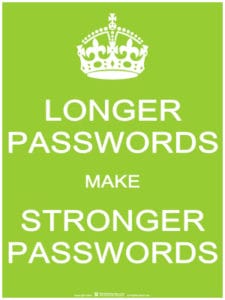Quick Password Tip
 Quick Password Tip: a reader asks…
Quick Password Tip: a reader asks…
In light of all the hacking, and our 21st century busy lifestyle, can you give me the short and sweet version of good password management?
Short and sweet it is: Use only long and unique passwords. Too short? Let’s unpack that just a bit. How long is long? These days, any password 13 characters or less are going to be at risk of being cracked using brute force methods. Hackers have built specialized computers that can try all the combinations of letters, numbers and special characters over and over again very fast when attempting to login to an online account. How fast? Think millions of attempts every minute.
It doesn’t matter about using uppercase versus lower case letters, numbers or ‘special’ characters. Nowadays it’s all about length. A good password would be 20 characters or more. Sure it takes longer to type, but after you’ve done it a few times it becomes easier (and there are ways around it I’ll talk about below). Of course, you have to work within the password rules established by each online entity, lots of them are still stuck in the old thinking that password complexity (numbers, letters, special characters) is important.
Some folks advocate for using four or five random words strung together to make a password that you can remember, like “bananaforestangrykeyboard”. You can make up a story that fits those words to help you remember. Such as “I ate a banana while walking through the forest and happened upon an angry person typing on a keyboard”. In my opinion this would be good advice if you only have a few online passwords to deal with. Which brings me to the second aspect: unique.
When I say “unique” I mean that the password you use on any one online login is not the same as any other online login. So that means a different password for your email account, your online banking account, your Amazon account, your Facebook account, your Twitter account, etc. These days so many of us have over a dozen (or a hundred!) different online identities. It seems like most everywhere you go online requires you to have an account.
 The combination of both long and unique in passwords pretty much mandates that you won’t be able to remember them all. Hence, the only way to really do this right is to use a password manager – that’s software/online service that creates a secure virtual vault to hold all those passwords and give them to you as you need one. Personally, I like and use LastPass, but any password manager will do, such as 1Password, Dashlane, KeyPass, Keeper, RoboForm, etc. If you’re new to using a password manager, do a quick google search on “password manager” and you’ll get lots of reviews and sales pitches (often disguised as reviews) for the various services.
The combination of both long and unique in passwords pretty much mandates that you won’t be able to remember them all. Hence, the only way to really do this right is to use a password manager – that’s software/online service that creates a secure virtual vault to hold all those passwords and give them to you as you need one. Personally, I like and use LastPass, but any password manager will do, such as 1Password, Dashlane, KeyPass, Keeper, RoboForm, etc. If you’re new to using a password manager, do a quick google search on “password manager” and you’ll get lots of reviews and sales pitches (often disguised as reviews) for the various services.
Your password manager should do this for you:
- Store your passwords in a virtual ‘vault’ that is encrypted and can only be unencrypted by you. This can be online or on your computer.
- Work with your web browser, smartphone and computer to create and store long and unique passwords as you use them.
- Deliver the needed password when you need it without a lot of work on your part. Meaning, fill them in for you when you need them so you don’t have to type those long passwords!
I’ve found that LastPass fits those requirements. Done.
This website runs on a patronage model. If you find my answers of value, please consider supporting me by sending any dollar amount via:
or by mailing a check/cash to PosiTek.net LLC 1934 Old Gallows Road, Suite 350, Tysons Corner VA 22182. I am not a non-profit, but your support helps me to continue delivering advice and consumer technology support to the public. Thanks!








Pingback: My Parent's Phobia - Practical Help for Your Digital Life®